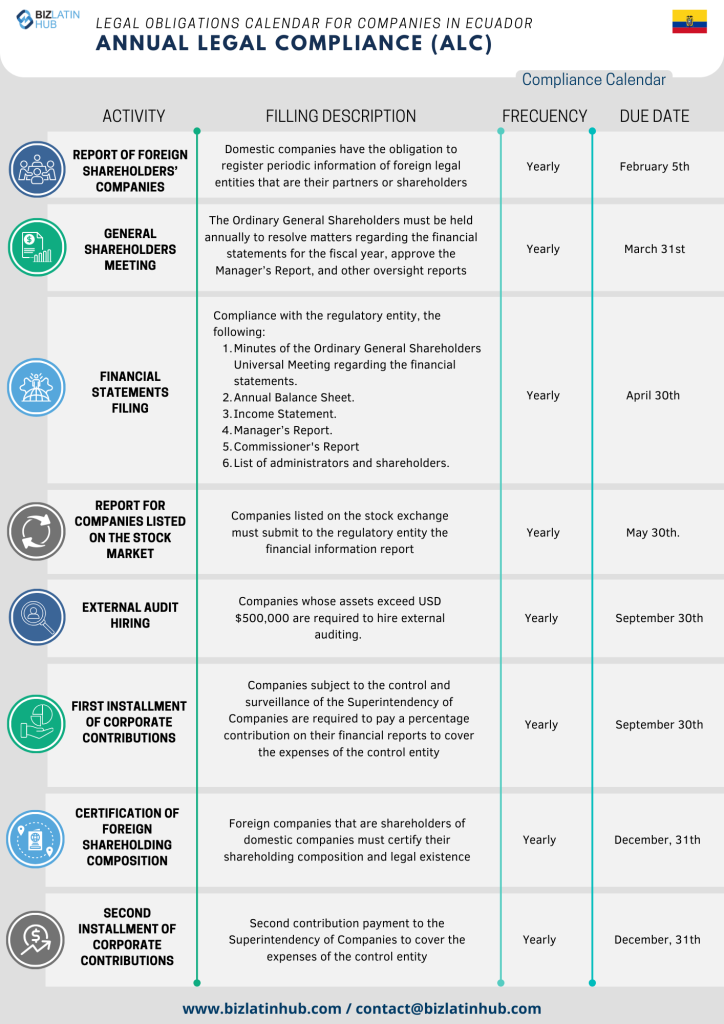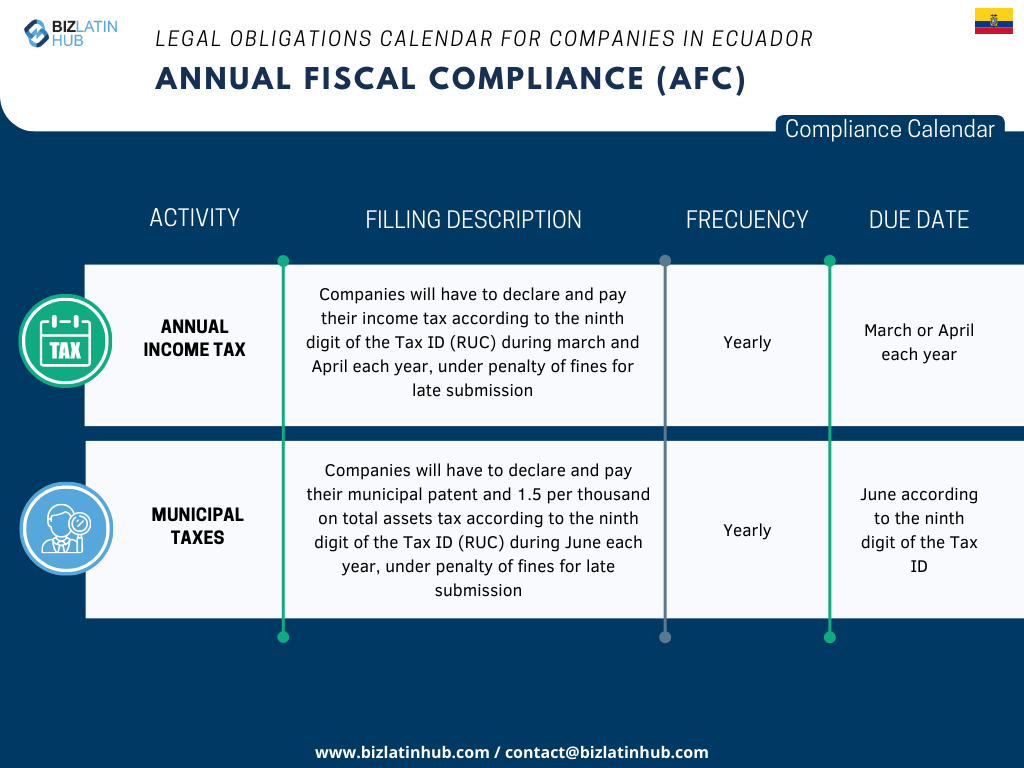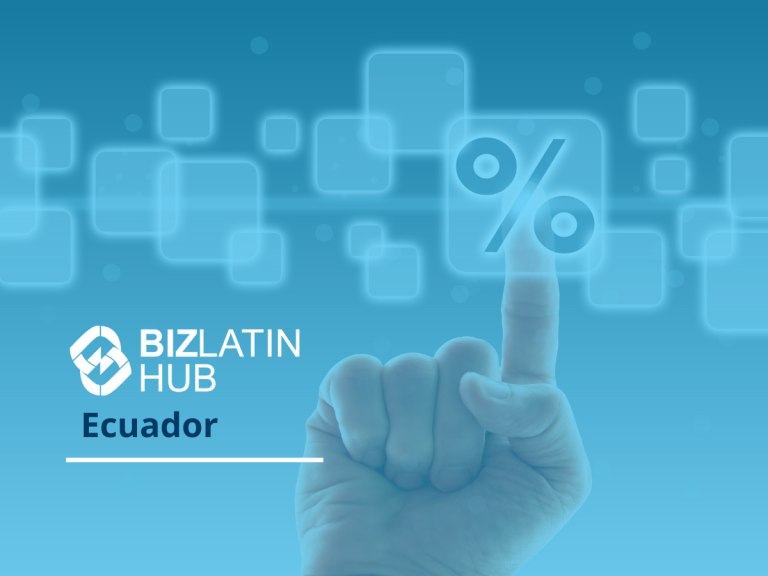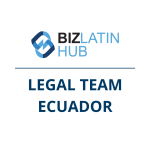Ecuador’s business landscape requires careful navigation for success. Understanding local regulations is crucial for companies operating within its borders. A thorough entity health check ensures compliance and helps avoid legal pitfalls.
The regulatory framework in Ecuador encompasses various compliance requirements that businesses must meet. These include financial obligations, data protection laws, and manufacturing regulations. A clear grasp of these elements is vital for maintaining operational integrity and fostering trust.
Understand the regulatory framework in Ecuador
In Ecuador, food product labeling follows strict regulations. Regulation RTE INEN 022:2014 requires a traffic light system. This helps consumers identify products high in sugar, fat, and salt. However, food supplements are exempt from this scheme.

The Ecuadorian Technical Norms NTE INEN 1334 – 1:2011 and NTE INEN 1334 – 2:2011 outline requirements for general and nutritional labeling. Food supplements must have labels with ingredient lists, storage conditions, and child safety warnings. Labels must be in Spanish and clearly readable.
Pharmaceutical and health product manufacturers must inform consumers about adverse effects and proper use. This ensures product safety and compliance with the law.
Data protection follows the Organic Law on the Protection of Personal Data (LOPDP). Enacted in 2021, it aligns with international standards. Organizations had until May 2023 to comply.
Key Regulations:
- Food Labeling: RTE INEN 022:2014
- Technical Norms: NTE INEN 1334 – 1 and 2
- Data Protection: LOPDP
These regulations ensure products in Ecuador meet health and safety standards, protecting consumers and their rights.
Identify corporate compliance requirements
In Ecuador, all legal entities must have a registered fiscal address. This is crucial for receiving official correspondence and ensuring compliance. Every year, entities must meet compliance standards. These include filing annual income tax, municipal taxes, and financial statements.
Financial obligations
Ecuadorian companies have specific financial obligations. Each year, these companies must hold an Ordinary General Shareholders Meeting by March 31st. During this meeting, they discuss financial statements and related matters. By April 30th, companies must file several documents with the authorities:
- Minutes of the Ordinary General Shareholders Universal Meeting
- Annual Balance Sheet
- Income Statement
- Managers Report
- Commissioner’s Report
- A list of administrators and shareholders
Table: Filing Deadlines and Requirements
| Deadline | Requirement |
|---|---|
| March 31 | Ordinary General Shareholders Meeting |
| April 30 | Submission of financial documents to authorities |
Ecuador requires companies in industries like oil, gas, and banking to comply with strict regulations. An auditor is necessary for companies with assets over USD$1,000,000. This requirement also applies to foreign branches with assets exceeding USD$100,000. Compliance with these regulations ensures that companies operate within the legal framework and meet international standards.
Data protection laws
Ecuador introduced its first comprehensive data protection law, the Ley Orgánica de Protección de Datos Personales (LOPDP), on May 26, 2021. Before the LOPDP, data protection in Ecuador was fragmented and limited in scope. The LOPDP recognizes personal data privacy as a constitutional right, aligning with international standards like the European Union’s General Data Protection Regulation (GDPR).
Key Aspects of the LOPDP:
- Constitutional Right: Establishes personal data privacy as a fundamental right.
- Compliance Deadline: Organizations had until May 2023 to comply. Non-compliance can lead to penalties.
- Alignment with GDPR: Similar principles to the GDPR aid organizations familiar with it.
Requirements for Organizations:
- Risk Assessments: Evaluate data processing risks.
- Legal Representatives: Appoint a person responsible for compliance.
- Data Protection Policies: Implement and maintain data protection measures.
Organizations must ensure their data processing activities meet these requirements. This promotes the protection of individuals’ fundamental rights under the LOPDP framework. Compliance helps protect against data misuse and enhances trust among stakeholders.
Review manufacturing regulations
Manufacturing regulations in Ecuador focus on consumer safety and clear information. Regulation RTE INEN 022:2014 requires the traffic light system on food labels to show high sugar, fat, and salt. Food supplements are not part of this scheme.
Pharmaceutical products must include details on adverse effects and usage instructions. These help protect consumers and ensure informed use.
The Ecuadorian Technical Norms, NTE INEN 1334 – 1:2011 and NTE INEN 1334 – 2:2011, guide food and nutritional labelling. Manufacturers must follow these for product compliance.
For food supplements for athletes, no hormones, anabolic compounds, or banned stimulants are allowed. This aligns with the International Convention Against Doping in Sport.
All food supplements must display a sanitary notification code or a GMP code. This confirms adherence to health regulations by Ecuadorian authorities.
Key Points:
- Traffic light labelling for foods (excluding supplements)
- Drug labels must inform on use and risks
- Norms NTE INEN 1334 dictate labelling standards
- Athlete supplements must be hormone and stimulant-free
- Labels must show a sanitary or GMP code
These rules ensure products are safe and consumers stay informed.
Transaction guidelines in Ecuador
In Ecuador, e-commerce transactions have specific regulations to protect consumers. Businesses must disclose detailed information during transactions. This transparency ensures consumer awareness and trust.
The general consumer protection regime also applies to the purchase and sale of crypto assets. However, trading cryptocurrencies remains illegal in Ecuador. Influencers promoting electronic services must avoid misleading content to comply with legal requirements.
Products subject to technical standards need the INEN-1 certificate. This certificate is essential for customs clearance and is valid for one year.
Sanitary registrations or notifications are required for various imported and domestic products, including:
- Processed foods
- Cosmetics
- Biological pharmaceuticals
Regulatory agencies oversee these sanitary controls to ensure public safety.
Summary Table:
| Requirement | Applicable To |
|---|---|
| Information Disclosure | E-commerce transactions |
| Consumer Protection | Crypto asset transactions (excl. cryptocurrencies) |
| Non-misleading Advertising | Influencer promotions |
| INEN-1 Certificate | Products under technical standards |
| Sanitary Registrations | Processed foods, cosmetics, pharmaceuticals |
Ecuador’s transaction guidelines aim to safeguard consumers by enforcing clear and strict regulations.
Advertising standards in Ecuador
In Ecuador, strict rules govern the advertisement of medicines. The National Institute of Hygiene and Tropical Medicine bans ads for drugs requiring prescriptions and psychotropic substances. Non-compliance with these rules demands corrections within five days. Failure results in suspension and ad withdrawal by the General Directorate of Health.
Specific laws like the Organic Law of Communication and the Organic Law of Consumer Defense enforce these standards. They impose penalties for misleading advertisements. Promoting drugs for non-approved uses is also prohibited.
To ensure compliance, advertisers must follow strict guidelines. Ads must be truthful and not misleading, aligning with Ecuador’s goal to protect public health. Below is a quick reference table summarizing key points:
| Regulation Aspect | Description |
|---|---|
| Prohibited Ads | Prescription and psychotropic drugs |
| Correction Time Frame | Maximum of five working days |
| Enforcing Bodies | General Directorate of Health |
| Governing Laws | Organic Law of Communication, Organic Law of Consumer Defense |
| Compliance Requirement | Ads must be truthful and not misleading |
These measures ensure clarity and safety in medical advertising, upholding public health standards.
Explore clinical trial considerations
Ecuador prioritizes ethical principles in clinical trials, as outlined in the Declaration of Helsinki. The rights of medical research participants come first. Research must promise preventive, diagnostic, or therapeutic benefits that justify participation without harming health.
Ecuador’s Constitution and Law 77, the Patient’s Rights and Protection Law, combat discrimination. They ensure equal rights for everyone in healthcare. Discrimination based on sex, race, age, religion, or social and economic status is prohibited. The Organic Health Law further supports access to health services for all.
Considerations for clinical trials in Ecuador include:
- Legal Framework: Compliance with ethical guidelines and laws.
- Participant Rights: Uphold non-discrimination and equal rights.
- Health Justification: Ensure benefits outweigh risks.
The following table summarizes key points:
| Consideration | Description |
|---|---|
| Ethical Principles | Prioritize participant rights and benefits |
| Legal Compliance | Adhere to Ecuadorian laws and guidelines |
| Equal Access | Implement non-discriminatory practices |
These considerations ensure safe and ethical clinical trials, respecting human rights in Ecuador.
Product recall procedures
Ecuador’s Ministry of Production oversees product recall procedures. They have two systems: mandatory and voluntary recalls.
Mandatory Product Recall:
- Trigger: Complaints or inspections.
- Action: Issued after judicial findings of non-compliance.
Voluntary Product Recall:
- Trigger: Initiated by the company.
- Purpose: Mitigate potential sanctions.
Key facts include:
- No specific laws for product recalls, showing a gap in Ecuador’s legal framework.
- Voluntary recalls are proactive measures by companies.
- Recalls do not cover products marketed abroad.
- Manufacturers must inform consumers of adverse effects.
Failure to notify consumers can lead to sanctions based on pharmacovigilance reports. This emphasizes the importance of product safety and transparency for manufacturers and importers.
Analyze the overall compliance landscape
Corporate entity compliance is crucial in Ecuador. Businesses must navigate various requirements to ensure smooth operations. Here is a brief analysis of the compliance landscape:
- Registered Office: Entities must maintain a registered office for official communications. This is fundamental for legal compliance.
- Fiscal Compliance: Annual obligations include:
- Income tax reporting
- Filing municipal taxes
- Submitting financial statements
- Shareholder Reporting: Companies must:
- Report foreign shareholders
- Conduct general shareholder meetings
- Certify foreign shareholding composition accurately
- Governance Assessments: Regular checks can identify compliance gaps. These evaluations assist businesses in aligning with local regulations.
Compliance Checklist in Ecuador
| Requirement | Frequency |
|---|---|
| Registered office address | Continuous |
| Income tax reporting | Annually |
| Municipal tax filing | Annually |
| Financial statement submission | Annually |
| Reporting foreign shareholders | Periodically |
| General shareholder meetings | Regularly |
| Foreign shareholding certification | As needed |
Routine assessments and a clear understanding of these obligations help businesses stay compliant within Ecuador’s legal framework.

Evaluate background check protocols
In Ecuador, employers and third-party services can legally conduct background checks on employees. Consent is necessary, particularly when checking political views and union memberships. Employers must follow specific mandates to ensure compliance with Ecuadorian regulations.
Components of a Background Check:
- Employment History Verification: Assess credibility by reviewing past job positions.
- Education Verification: Confirm academic qualifications and certifications.
- Personal Information Check: Verify identity through documents like an identity card.
Background checks help verify candidate credentials. They reduce the risk of hiring individuals with falsified data. Employers must ensure the process aligns with legal and human rights standards. Here is a key step to keep in mind before conducting checks:
- Obtain explicit consent from the candidate.
- Inform candidates about the scope of the background check.
- Use authorized entities for data collection and verification.
Implementing these protocols can lead to a more secure hiring process in Ecuador. It supports compliance with both national and international standards. By maintaining strict adherence, companies protect themselves and uphold fundamental rights.
Understand the role of auditors in compliance
Auditors play a vital role in ensuring compliance for companies in Ecuador. They help businesses adhere to complex financial regulations. Their role is crucial, especially after new income tax regulations were enacted in late 2022.
Key Functions of Auditors:
- Compliance Assistance: Auditors guide companies in meeting compliance standards and regulatory requirements.
- Tax Regulation Updates: They keep companies informed about changes in income tax and other financial laws.
- Tax Benefits: Auditors explain the benefits of reduced income tax rates for new or investing companies.
- Dispute Mediation: They assist in mediating tax disputes, acting as advisors to resolve potential conflicts with the IRS.
Benefits of Auditors:
- Understanding Regulations: Auditors help clients understand and follow applicable regulations.
- Reducing Risks: They conduct risk assessments to identify potential compliance issues.
- Navigating Changes: With new laws, auditors are critical for staying updated and compliant.
In Ecuador, auditors ensure that legal entities, whether local or foreign, comply with financial statutory requirements, adding value to their operations.
The Superintendency of Data Protection supervises data protection regulations in Ecuador. This agency ensures companies comply with existing laws. Companies must respond to data subject rights inquiries within 15 days. This timeframe underscores the need for timely regulatory compliance. The right to data portability requires offering personal data in a machine-readable format. This rule highlights the importance of respecting data subject rights in Ecuador. More regulations from the Data Protection Authority are expected to clarify these rights. Exceptions to data portability include data derived from processing personal information.
Collection and processing standards
Regulation RTE INEN 022:2014 regulates food product labels in Ecuador. It uses front-of-pack traffic light symbols to show sugar, fat, and salt levels. Food supplements must display specific details, all in Spanish. Labels must include the product name, ingredients, usage instructions, and nutritional facts. Also, manufacturing and expiration dates, batch numbers, and sanitary codes are necessary. Compliance with these labeling requirements is key for product approval and health checks. Hormones and certain doping substances are banned in food supplements.
Security measures
Food supplements in Ecuador need a sanitary notification from ARCSA. This ensures products meet health regulations. Applications must include details about the product composition, packaging, manufacturers, and shelf life. Documentation such as label drafts and manufacturing process descriptions is also required. The SAE accredits labs to issue certificates confirming compliance with standards. Vendors register supplements through ECUAPASS, ARCSA’s online system.
Breach notification requirements
The background information provided does not include details on breach notification requirements. Therefore, additional data would be needed to inform on this subject accurately.
Collection and processing standards
In Ecuador, food product labeling follows strict collection and processing standards. Regulation RTE INEN 022:2014 governs these standards. It introduces a front-of-pack traffic light system. This system informs consumers about sugar, fat, and salt content.
Food supplements must display specific information. Labels must include the product name, ingredient list, usage instructions, and nutritional info. All details must be in Spanish and clearly visible.
Key labeling requirements include:
- Manufacturing and expiration dates
- Batch or lot numbers
- Sanitary notification code or GMP code
Compliance with Ecuadorian Technical Norms is crucial. This involves NTE INEN 1334 – 1:2011 for general labeling and NTE INEN 1334 – 2:2011 for nutritional labeling.
Prohibited substances in food supplements are hormones, compounds with anabolic effects, and those listed in the International Convention Against Doping in Sport.
The table below summarizes the main labeling elements:
| Labeling Element | Requirement |
|---|---|
| Language | Spanish |
| Visible Details | Yes |
| Manufacturing Date | Required |
| Expiration Date | Required |
| Batch/Lot Number | Required |
| Sanitary Notification/GMP | Required |
These standards ensure product safety and regulatory compliance.
Security measures
In Ecuador, managing food supplement registration involves key security measures. The Ecuadorian National Agency for Health Regulation, Control and Surveillance (ARCSA) uses ECUAPASS, an online system, to enhance safety and compliance.
Applicants submit detailed product information through ECUAPASS. This includes:
- Product composition
- Packaging details
- Manufacturer information
- Shelf-life data
The application must also include documentation like:
- Label drafts
- Manufacturing process description
- Specifications of organoleptic, physical, chemical, and microbiological properties
These steps ensure that products meet national and international standards, safeguarding public health.
The Ecuadorian Accreditation Service (SAE) accredits labs to provide conformity assessment certificates. These certificates are vital for confirming product compliance.
By using ECUAPASS, ARCSA ensures a secure submission process. Vendors can efficiently maintain regulatory compliance, thus ensuring product safety and quality.
Breach notification requirements
Breach notification requirements in Ecuador focus on data protection and privacy. Organizations must inform relevant authorities and affected individuals if a data breach occurs. The notification should include details about the breach, affected data, and protective measures taken.
Key Elements of Breach Notification:
- Scope: Applicable to legal entities handling personal data.
- Time Frame: Notify the competent authority without undue delay. Prompt notification is recommended.
- Content: Provide information on the breach nature, affected data categories, potential consequences, and steps to mitigate risks.
- Communication: Maintain clear records of breach impact assessments and measures.
Legal representatives must ensure compliance. Adhering to these requirements protects fundamental rights and aligns with international standards. The Ecuadorian government’s regulatory framework addresses data breaches within legal and economic activities.
For a secure environment, organizations must regularly update their procedures. Legal persons and natural persons should engage in risk assessments to strengthen data protection.
Develop strategies for optimized business operations
TMF Ecuador aids businesses in expanding into international markets. They have over 50 years of experience. Their services help ensure compliance with local regulations. This helps businesses avoid legal issues as they grow.
Key Strategies for Optimized Operations:
- Substance Compliance Services:
- Assess current business situations.
- Recommend steps for ongoing compliance in Ecuador.
- Accounting Software Parametrization:
- Essential for local compliance.
- Optimizes financial reporting processes.
- Registered Office Establishment:
- Critical for entities in Ecuador.
- Facilitates official correspondence and compliance.
Focus Areas:
- Legal Compliance: Adhering to Ecuadorian regulations ensures smooth operations.
- Efficient Financial Reporting: Proper accounting setup enhances transparency and accuracy.
- Established Communication Channels: A registered office address is essential for receiving official correspondence.
These strategies can streamline operations and enhance business efficiency in Ecuador.




